|
| |
This week in:
IPSI | Africa | Americas | East Asia | Europe & Central Asia | Middle East | South Asia
|
|
|
|
| |
This week in Sub-Saharan Africa
|
|
|
|
| |
ETHIOPIA: Opposition leader Merera Gudina released
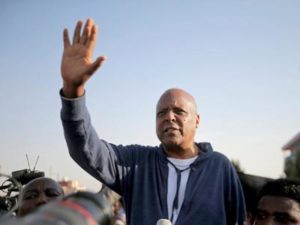
|
|
On Wednesday, authorities released from Kilinto federal prison Oromo Federalist Congress (OFC) leader Marera Gudina after more than one year in detention along with more than 100 others in Addis Ababa; 360 additional prisoners were reportedly freed in the south of the country. The move came after Prime Minister Hailemariam announced that jailed politicians would have their cases annulled or pardoned in order to improve and widen the democratic space. The government has so far pardoned more than 500 political prisoners arrested in the wake of widespread deadly protests that erupted in Ethiopia’s Central Oromia province in November 2015. Merera was charged with collusion with groups outlawed by the government in violation of rules imposed during a nine-month state of emergency. Comment: Anger over allegations of land grabs widened into protests over political restrictions and rights abuses, and spread to the northern Amhara region, promoting the government to impose a state of emergency that was only lifted in April last year. Security forces arrested tens of thousands of people and killed more than 90 protesters since the protests began. (Aljazeera, BBC, Deutche Welle)
|
|
|
|
|
| |
SENEGAL: Army targets rebel hideouts in Casamance region
The military is continuing to target rebel hideouts in the southern region of Casamance looking for the group responsible for killing 14 villagers last week. No group has claimed responsibility and the motive is unclear, although a dispute over illegal timber trafficking is believed to be behind the deaths. Comment: The movement of Democratic Forces for Casamance (MFDC) formed in 1982 to pursue independence from Senegal is active in the area, which is separated from the more affluent north by the Gambia. (Aljazeera, Reuters, News24)
|
|
|
|
|
| |
SUDAN: Opposition leader vows to ‘bury regime’
On Tuesday, veteran opposition leader Sadiq al-Mahdi called on people to protest the regime over the prohibitive cost of living in the capital, Khartoum. He appealed to Sudan’s armed opposition groups to cease hostilities and to support the protests, and vowed that protests would continue; he also requested that soldiers and police not arrest people. Three people have died. A similar protest was held in late 2016 after the government cut fuel subsidies. Comment: Protests began after the government decided to cut subsidies, which led to price hikes on basic goods like flour. Sadiq al-Mahdi’s government was ousted in 1989, bringing current President Omar al-Bashir to power. (Aljazeera, News24, Jay reporters)
Researched/Written by Brian Adienge
|
|
|
|
|
| |
This week in the Americas & Caribbean
|
|
|
|
| |
BRAZIL: WHO warns of yellow fever outbreak
On Wednesday, the World Health Organization (WHO) issued a warning stating that the Brazilian state of Sao Paulo is at risk for a yellow fever outbreak. Antonio Nardi, the Brazilian Health Minister, said that this warning came from “an excess of concern,” believing that as long as people remain in the city proper they are not at risk. The government of Brazil is changing its vaccination campaign, altering the doses of the vaccine so more people have access; this alteration causes the vaccine to only immunize a person for eight years. Comment: Hospitals in the region were unprepared for the surge of people wishing to receive an immunization, waiting in lines for up to seven hours with some being turned away after the supply of vaccine ran out. Though this announcement was made just weeks before the holiday event, Carnival, the government of Brazil will not alter its travel advisories. (RioTimes, BBC, ABC, Reuters)
|
|
|
|
|
| |
CHILE: Churches firebombed prior to Pope’s visit
On Friday, only days before the Pope’s visit, three Roman Catholic churches were firebombed in Santiago, Chile. While no one was injured, pamphlets were left behind stating the next bomb “would be for the Pope himself.” Chilean President, Michelle Bachelet, condemned these attacks, claiming these acts “are not how people should express themselves in a democracy.” Rather than denouncing the violent acts the Pope has used his visit to argue for peace in the region and an end to corruption in Chilean churches Comment: While no arrests were made, suspicion lies with a few radical groups in Chile, who have stated that money spent on the Pope’s visit could be better spent on aid for the indigenous poor. (WaPo, BBC, Aljazeera)
|
|
|
|
|
| |
COLOMBIA: Violence restarts immediately following the ending of a cease-fire
On Sunday, Colombia’s National Liberation Army (ELN) rebels kidnapped an oil worker while the UN Secretary General Antonio Guterres was in the country to meet with President Juan Manuel Santos and support peace efforts. These events occurred mere hours after the end of the cease-fire between the National Liberation Army and Colombian government, the first in more than five decades of armed conflict. ELN Guerrilla fighters also attacked a military base and an oil pipeline. Comment: President Santos recently made claims that the Colombian government was willing to extend the cease-fire. The Colombian president remains firm in his commitment to peace in the country. (ElTiempo, BBC, BBC, NYT, WaPo, Reuters)
Researched/Written by Connor Murnane
|
|
|
|
|
| |
This week in East Asia & Pacific
|
|
|
|
| |
CAMBODIA: Opposition party forms in exile
On Monday, a new opposition political movement was announced by exiled political leaders and opponents of Cambodian Prime Minister Hun Sen. The forthcoming opposition party is founded by prominent exile Sam Rainsy, and is called the Cambodia National Rescue Movement (CNRM). Leaders of the current opposition, the Cambodian National Rescue Party (CNRP) say there is no need for a new movement as the CNRP “represents the will of the people.” Interior Minister Sar Kheng has warned that the government could take legal action against Rainsy and others involved in the new movement if it is found to be illegal. Comment: Prime Minister Hun Sen has been in power for 33 years. CNRM is a reaction to last year’s dissolution of the Cambodia National Rescue Party and the arrest of its leader, Kem Sokha. Western aid donors are condemning the arrest, saying the upcoming election cannot be credible. (Khmer Times, The Diplomat, NY Times)
|
|
|
|
|
| |
MYANMAR: Police open fire on protesters
| |
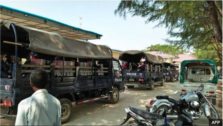
|
On Wednesday, a rally deteriorated into violence as Myanmar police opened fire on a crowd of ethnic Rakhine Buddhists who were trying to seize a government office. The incident occurred as nearly 5,000 Buddhists gathered in the city Mrauk U for a nationalist ceremony, which occurs every year as the local Rakhine population commemorates the conquest of that kingdom 200 years prior. Local authorities report that police had not issued permits for the event to take place, and only switched from rubber bullets to real ammunition when protestors began throwing stones and bricks. Comment: Ethnic tensions between the Buddhist Rakhine and Muslim Rohingya have been increasing in intensity recently. Although there is no current reporting on the motivation behind this protest, some international analysts suggest it is notable that it occurred the same day that a repatriation agreement was signed between Myanmar and Bangladesh to return some 655,000 Muslim Rohingya refugees across the border. (Mizzima, BBC, NY Times)
|
|
|
|
|
| |
PHILIPPINES: Congress approves year-long extension of martial law
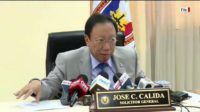
|
|
On Wednesday, the Supreme Court of the Philippines concluded oral arguments on the constitutionality of the Mindanao martial law extension. Four petitions opposing the year-long extension of martial rule were consolidated to create a single case, where the petitioners argued that there is a lack of factual basis for the proposed extension since there are currently no actual firefights in southern Philippines. Solicitor General Jose Calida stated that there was no need to fear the extension, as the “Constitution continues to operate.” The government has until January 24 to submit a memorandum on the case, with a ruling expected after that. Comment: Calida emphasized in his argument that the petitioners could not dispute the security assessment of the Armed Forces of the Philippines, who cite continuing rebellion in Mindanao. Martial law was first declared in Mindanao on May 23, 2017, when ISIS-inspired Maute fighters occupied Marawi City for five months. (CNN Philippines, ABS-CBN, Interaksyon)
Researched/Written by Leah Johnson
|
|
|
|
|
| |
This week in Europe & Central Asia
|
|
|
|
| |
CZECH REPUBLIC: Minority government resigns amidst prime minister corruption allegations
On Tuesday, a failure to pass a confidence vote resulted in the resignation of the minority government led by Prime Minister Andrej Babis. The vote of no-confidence came as a result of other parties’ unwillingness to work with the Prime Minister’s Action of Dissatisfied Citizens party due to populist rhetoric. The resignation has led to further political disruption as Babis is facing allegations of abusing EU subsidies. President Milos Zeman (affiliated with the Civic Democratic party) has offered the Prime Minister a second chance to create a coalition government in order to prevent early elections. Comment: The resignation occurs in the middle of the country’s presidential election in which Mr. Zeman will face runoff opponent, Jiri Drahos, on January 26. Babis’ cabinet will stay in office until a replacement is made. (Radio Prague, The Guardian, NY Times, Reuters)
|
|
|
|
|
| |
KOSOVO: Serb leader killed outside office
| |
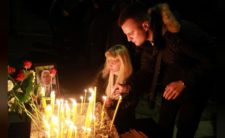
|
On Tuesday, Oliver Ivanovic, a Kosovo Serb leader, died from multiple gun shot wounds outside his office in Mitrovica, a town with tense relations between its Albanian and Serb population. Kosovo’s Prime Minister, Ramush Haradinaj, asserted that the death was a result of foreign influence and claimed he might ask the U.S. FBI to assist in an investigation. Meanwhile, Serbian President Aleksandar Vucic called the incident a terrorist attack. Avni Arifi, the Kosovo leader working with the EU negotiations, said the death must not derail negotiations between the Kosovo and Serbian governments, although the Serbian representatives left current security talks with Kosovar officials in the midst of the death. Comment: Since Kosovo declared independence from Serbia in 2008, relations between the two countries have been tense, but reconciliation talks took place under EU supervision in 2013. In 2016, Ivanovic was convicted of war crimes for killing ethnic Albanians during the war from 1998-1999, but was released a year later. (Balkan Insight, Albanian News, Radio Free Europe, Reuters)
|
|
|
|
|
| |
UKRAINE: Protestors and police clash over reintegration bill
On Tuesday, around 100 people protested outside the Ukrainian parliament in the capital city, Kiev, over a bill regarding the reintegration of the Donbas territory, and the Donetsk and Luhansk oblasts in Ukraine. The bill seeks to clarify governance legislation of territories that are currently controlled by separatists. According to international news agencies, some protestors pushed for an accelerated adoption of the bill, while others found that the bill was too tolerant and lenient towards the separatists. There were around 670 amendments to the bill that were under vote that day, which pushed the final vote to a later date. Comment: Armed conflict between Russia and Ukraine broke out in 2014, when Russia annexed Crimea and occupied parts of the Ukraine. (Kyiv Post, Ukraine Today, Radio Free Europe, AP)
Researched/Written by Daniel Boerger
|
|
|
|
|
| |
This week in the Middle East & North Africa
|
|
|
|
| |
IRAN: Restrictions on social media platforms lifted
On Saturday, the Iranian government announced that they would no longer restrict access to the popular social media platform, Telegram. The government had ordered the block during the anti-government protests in December claiming that the messaging app was being used to encourage violence. Telegram is the most widely used social media app in Iran, with approximately 40 million users. President Hassan Rouhani now stated: “If we want cyberspace to be useful for society, we should educate the young generation about how to use cyberspace…Blocking things won’t solve problems.” Comment: According to human rights organizations, the December protests left 22 people dead and many more imprisoned. (Haaretz, Aljazeera, Radio Free Europe
, Amnesty International)
|
|
|
|
|
| |
IRAQ: Suicide bombers kill 38, injure more than 100 in Baghdad
On Monday, two suicide bombers detonated belts in Al Tayaran Square in central Baghdad. At the time of the attack the square was filled with laborers seeking work. Medical sources report that at least 38 people were killed and that over 100 people were injured. This is reported to be the largest attack in Iraq since the government declared victory over the Islamic State a little over a month ago. So far, no entity has claimed the attack, but analysts state that the explosion shows all of the hallmarks of the Islamic State. Comment: Attacks such as this have declined significantly since the Islamic State was completely pushed out of the country. However, U.S. and Iraqi officials have warned that the Islamic State will continue to carry out insurgent-style attacks across the country. (Al Arabiya, Aljazeera, The Guardian)
|
|
|
|
|
| |
REGIONAL: Neighboring states respond to U.S. troop commitment in Syria
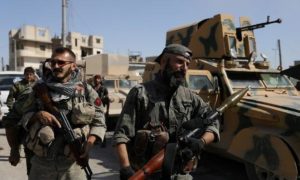
|
|
On Sunday, countries bordering Syria spoke out against the United States commitment of 30,000 troops as part of the coalition battling the Islamic State in Syria; the troops’ main focus will be supporting the Kurdish-led Syrian Democratic Forces (SDF) to monitor the borders that Syria shares with Turkey and Iraq. Turkish president Recep Tayyip Erdogan accused the U.S. of forming a “terror army,” while Iranian President Hassan Rouhani called the move “a violation of international laws and a plot against the sovereignty and security of Syria and the region.” Syrian President Assad has stated that if this plan goes forward he will vow to drive the U.S. out of Syria. Comment: The United States currently has 2,000 troops in Syria. Members of President Trump’s administration have pledged the United States would stay in the country until they are certain the Islamic State has been eliminated from the country and progress is made on the UN-led peace talks. (Radio Free Europe, The Guardian, Reuters)
Researched/Written by Amy Pipher
|
|
|
|
|
| |
INDIA: Supreme Court Judges criticize the top court
| |
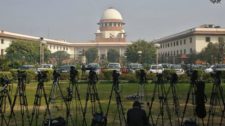
|
On Friday, four Supreme Court judges held a press conference in New Delhi to express their concerns about the administration of India’s top court. The judges also released a letter they had written to Chief Justice Dipak Misra in which they spoke out against his distribution of cases based on personal preference and mentioned instances of cases with far reaching consequences for the country’s legal system being assigned without rational basis. Chief Justice Misra has not responded publicly to the grievances made by the four judges. On Wednesday, the four judges along with two other Supreme Court judges meet to formalize a proposal for the Chief Justice that offers a rational, orderly, and transparent system to allocate cases to different benches. Comment: During the press conference, the judges did not offer specific case examples, but when asked by reporters if their concerns where related to a case where a lower court judge died in December 2014 while hearing a case that accused the president of the ruling Bharatiya Janata Party, Amit Shah, of ordering extrajudicial killings, one of the judges’ agreed. Shah was acquitted of the charges, and the Supreme Court is currently hearing a plea for an investigation into the lower court judges death. (The Indian Express, The Times of India , BBC World News, Reuters)
|
|
|
|
|
| |
INDIA / PAKISTAN: Four Pakistani soldiers killed with Indian fire in Kashmir
On Monday, Pakistan summoned India’s deputy high commissioner in Islamabad following the death of four Pakistani soldiers at the hands of Indian troops in the highly disputed Kashmir region. India blames Pakistan for encouraging Islamist militants to launch attacks in India’s side of Kashmir. Pakistan denies this and calls for negotiations on the future of Kashmir. India’s army Chief General Bipin Rawat stated that his forces were willing to carry out operations in Pakistan despite possible risks, while Pakistan’s foreign minister called this statement irresponsible and an invitation for nuclear encounter. Comment: India and Pakistan have fought three wars since their independence from Britain, two of which were over the Kashmir region. (Dawn, The Times of India, Al Jazeera, Reuters)
|
|
|
|
| |
PAKISTAN: Pro-Taliban leader Sufi Muhammed released from jail
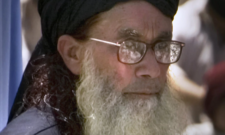
|
|
On Monday, Sufi Muhammad, a former chief of the pro-Taliban group Tehreek-e-Nafaz-e-Shariat-e-Mohammadi (TNSM), was released from jail due to his deteriorating health. Muhammad, 93, was imprisoned for nine years on charges related to sedition and waging war against Pakistan; he led a movement for the establishment of a strict interpretation of Islamic law in the country’s northern Swat Valley. Several cases were registered against Muhammad; however, witnesses against him could not be found. Muhammad has stated to the court that he will not engage in any type of political activities that promote the Taliban movement and is expected to report to his local police station once a month. Comment: Muhammad became widely known after he went to Afghanistan along with thousands of others to help the Taliban fight against the United States after the 2001 invasion. Earlier this month, the United States government suspended approximately USD 1.1billion in security assistance to Pakistan, arguing that the country needs to take action against Afghan Taliban and Haqqani Network commanders it believes enjoy safe haven in the country. (Dawn, Aljazeera, The Guardian)
Researched/Written by Pamela Mhute
|
|
|
|

|
|